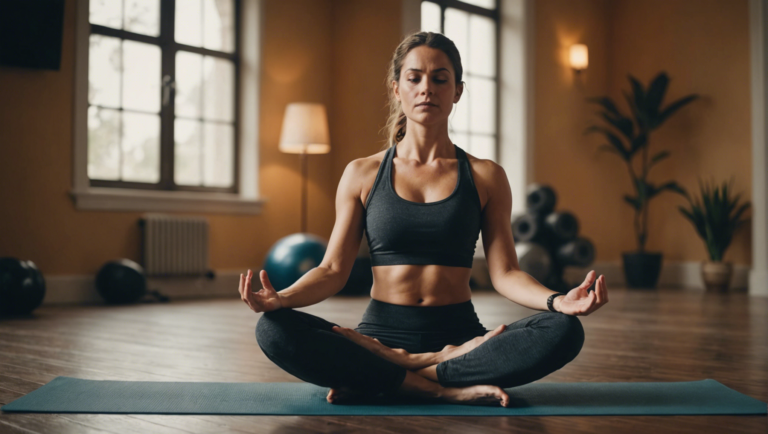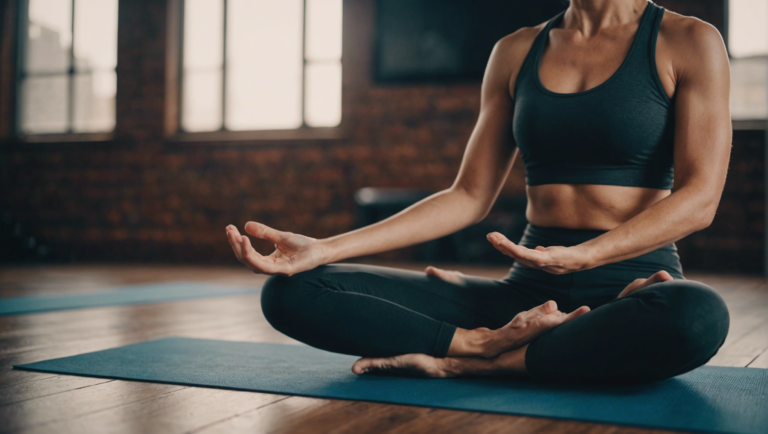Exploring The Benefits Of Yoga For Mental Health Improvement
The Psychological and Emotional Impacts of Yoga on Mental Health
In the modern era, where mental health has taken a forefront in our discussion of well-being, yoga emerges as a beacon of hope for many grappling with psychological and emotional challenges. The ancient practice, originated in India over 5,000 years ago, has evolved into a global phenomenon recognized not just for its physical benefits, but notably for its profound effects on mental health. This article delves into the psychological and emotional impacts of yoga, offering insights into how this holistic practice can serve as a powerful tool in improving mental health.
The Science Behind Yoga and Mental Health
Yoga’s positive effects on mental health are backed by an increasing body of scientific research. Studies have shown that regular yoga practice can lead to significant reductions in levels of stress, anxiety, and depression. This can be attributed to yoga’s ability to decrease the production of cortisol, the body’s main stress hormone, while enhancing the production of serotonin, often referred to as the happiness hormone.
Moreover, yoga increases the levels of gamma-aminobutyric acid (GABA) in the brain, a neurotransmitter essential for a calm and balanced mood. These chemical changes in the brain highlight yoga’s capacity to alter our psychological states, offering a natural remedy for those battling mental health issues.
Unraveling the Link Between Yoga and Emotional Well-being
Yoga provides a unique integration of body and mind, propelled by mindful movements, focused breathing, and meditation. This synergy fosters a heightened sense of awareness and presence, enabling individuals to cultivate a deeper connection with their inner selves. Through regular practice, yoga assists in unraveling the layers of emotional baggage, offering a path towards healing and emotional stability.
The aspect of mindful breathing, in particular, is a cornerstone in managing emotional turmoil. By teaching practitioners to breathe through discomfort, yoga offers invaluable lessons in resilience and emotional regulation, applicable both on and off the mat.
Engaging the Parasympathetic Nervous System for Stress Relief
One of the most immediate benefits of yoga on mental health is its ability to engage the parasympathetic nervous system (PNS), also known as the rest and digest system. Activation of the PNS through yoga practice triggers a relaxation response in the body, countering the stress-induced activation of the sympathetic nervous system. This not only alleviates immediate stress and anxiety but also has long-term benefits for stress management and overall mental health.
Yoga as a Coping Mechanism for Anxiety and Depression
For individuals dealing with anxiety and depression, yoga can serve as a potent coping mechanism. By promoting a meditative state of mind, yoga helps in detaching from tumultuous thoughts and emotions, providing a sense of calm and clarity. The practice of various asanas (postures) also plays a crucial role, as physical movements can help in dissipating tension and stress accumulated in the body.
Furthermore, the supportive and non-judgmental yoga community offers a sense of belonging and support, which is crucial for those feeling isolated due to their mental health struggles. This sense of community can significantly enhance the therapeutic effects of yoga, underscoring the importance of social connections in mental well-being.
Empowering Individuals Through Self-Awareness and Mindfulness
At its core, yoga is a journey of self-discovery, empowering individuals with tools of self-awareness and mindfulness. These tools are essential for navigating the complexities of human emotions and psychological states. Practitioners learn to observe their thoughts and emotions without judgment, leading to greater emotional resilience and stability.
Mindfulness practices inherent in yoga also encourage living in the present moment, a skill that can greatly reduce tendencies towards rumination and worry, common triggers of mental health issues.
Final Thoughts
Yoga, with its multifaceted approach to well-being, offers a compelling case for its inclusion in mental health strategies. As society continues to recognize the importance of mental health alongside physical health, yoga stands out as a holistic and accessible tool capable of transforming lives. Whether it’s through reducing stress, enhancing emotional well-being, or fostering a supportive community, the psychological and emotional impacts of yoga on mental health are profound and far-reaching, making it a practice worth embracing for anyone seeking to nourish their mind, body, and spirit.
Yoga as a Tool for Stress Reduction and Mindfulness
Yoga, an ancient practice with roots stretching back thousands of years, has transcended time and cultivated a universal appeal. In the contemporary hustle, where stress has become an unwelcome yet constant companion, yoga emerges as a serene sanctuary. The intertwining of physical postures, breathing exercises, and meditation not only fosters physical well-being but also profoundly nurtures mental health. It’s a holistic approach that renders yoga not just as a physical workout but as a comprehensive tool for stress reduction and enhancing mindfulness.
The Science Behind Yoga and Stress Reduction
At the heart of yoga’s effectiveness in stress reduction is its ability to downregulate the body’s stress response. When we engage in yoga, the practice promotes the emergence of a relaxation response in the body. This counteracts the stress-induced activation of the sympathetic nervous system, characterized by the "fight or flight" response, with a calming parasympathetic response, known as the "rest and digest" mode. Scientific studies have mapped out how yoga modulates stress hormones like cortisol, thereby alleviating stress and fostering a state of calm.
Yoga Poses for Alleviating Stress
Yoga encapsulates a variety of poses, each with its unique benefits. Certain poses are especially potent in mitigating stress. For instance, the Child’s Pose (Balasana) acts as a comforting retreat, offering mental peace and easing tension in the body. Similarly, the Tree Pose (Vrikshasana) emphasizes balance and focus, redirecting the mind from stressors to a state of mindful equilibrium. Including these poses in a regular practice can be a transformative experience for those besieged by stress.
Breath Control: The Gateway to Mindfulness
Central to yoga is the practice of pranayama, or breath control, which plays a pivotal role in enriching mindfulness and reducing stress. Techniques like the Alternate Nostril Breathing (Nadi Shodhana) bring harmony and balance to the body’s energy channels, promoting mental clarity and a tranquility of mind. This conscious regulation of breath acts as a bridge between the mind and body, offering an accessible route to present-moment awareness and significantly lowering stress levels.
Meditation and Mindfulness in Yoga
Meditation, intricately woven into the fabric of yoga, enhances its efficacy in combatting stress. Through meditation, practitioners cultivate an acute awareness of the present, silencing the incessant chatter of the mind. This form of focused attention alleviates anxiety and stress by anchoring the practitioner in the here and now, dimming the overwhelming stimuli that often engulf daily life. The integration of mindfulness and meditation into yoga provides a robust framework for mental fortitude and emotional resilience.
Regular Practice: The Path to Sustained Benefits
For yoga to be most effective in stress reduction and the cultivation of mindfulness, consistency is key. A regular yoga practice fortifies the mind-body connection, gradually enhancing one’s threshold for stress and fostering a sustained sense of mental clarity and calm. This does not necessitate hours of daily practice; even short, daily sessions can yield tremendous benefits over time, making yoga a flexible and accommodating tool for mental health improvement.
The Transformative Power of Yoga
Yoga, with its rich legacy and profound implications for mental health, stands out as a beacon of peace in the tumultuous sea of modern life. It is an invitation to slow down, breathe, and reconnect with oneself. As an enduring tool for stress reduction and the promotion of mindfulness, yoga offers not just a practice but a pathway to a more serene and balanced life.
Embracing yoga is to embark on a journey toward inner tranquility, where the reduction of stress and the cultivation of mindfulness open the doors to a life marked by harmony and well-being. It’s an ancient solution to a modern predicament, proving that sometimes, the best way forward is to look back to the wisdom of the ages.
The Role of Breathing Exercises in Enhancing Mental Clarity and Focus
In our bustling world, finding moments of peace and enhancing mental clarity has become a priority for many. Among the myriad of strategies available, breathing exercises stand out as a powerful tool to improve focus and foster a deep sense of mental well-being. These techniques, rooted in ancient practices, offer a doorway to a balanced mind, serving as an anchor in the storm of daily life.
The Science Behind Breathing and Mental Clarity
Breathing exercises are more than just taking deep breaths; they are scientifically proven methods to influence our physiological and psychological states. When we engage in controlled breathing, we stimulate the parasympathetic nervous system, often referred to as the "rest and digest" system. This stimulation induces a state of calmness, reducing stress hormones in the body, lowering heart rate, and blood pressure, which in turn enhances mental clarity and focus.
Techniques to Enhance Focus Through Breathing
Several breathing techniques have been identified as particularly beneficial for mental clarity and focus. One such method is the 4-7-8 technique, which involves inhaling for 4 seconds, holding the breath for 7 seconds, and exhaling for 8 seconds. This rhythm acts as a mental reset, offering a break from the constant stream of thoughts and distractions.
Another effective approach is diaphragmatic breathing, or deep belly breathing, which encourages full oxygen exchange and directly impacts the brain’s emotional center, calming anxious thoughts and sharpening focus.
Integrating Breathing Exercises into Daily Life
The beauty of breathing exercises lies in their simplicity and accessibility. They require no special equipment or environment and can be practiced anywhere, at any time. Setting aside a few minutes each day to engage in these exercises can make a profound difference in mental clarity and overall well-being.
Real-Life Impact of Breathing Exercises
Countless individuals have reported significant improvements in their mental health and cognitive function as a result of consistent practice of breathing exercises. Students have found them especially useful for enhancing concentration before exams, while professionals use them to manage stress and foster creativity in the workplace.
Research and Studies Supporting Breathing Exercises
A wealth of research supports the positive effects of controlled breathing on the mind. Studies have demonstrated reduced anxiety levels, improved cognitive performance, and increased attention span among those who incorporate breathing exercises into their routine.
Expert Views on the Role of Breathing in Mental Health
Mental health experts and neuroscientists alike advocate for the inclusion of breathing exercises in mental health treatment and stress management strategies. Their simplicity, coupled with their profound impact, makes them an invaluable tool in the quest for mental clarity and focus.
Planning a Routine for Mental Clarity
To fully harness the benefits of breathing exercises for mental clarity, it’s important to make them a consistent part of your daily routine. Finding a quiet moment, perhaps in the morning or before bed, to practice can help establish a habit that supports mental health and enhances focus throughout the day.
The Future of Breathing Exercises in Mental Health Care
As awareness of the benefits of breathing exercises grows, they are increasingly being integrated into formal mental health care practices. From mindfulness programs to psychotherapy techniques, the role of controlled breathing in enhancing mental clarity and focus is gaining recognition.
Breathing exercises represent a bridge between the physical and mental realms, offering a simple yet profound method for enhancing mental clarity and focus. In an era where mental well-being is of paramount importance, these practices emerge as key tools in achieving a balanced, focused state of mind.
Yoga and Its Contribution to Better Sleep Patterns and Mental Relaxation
In the realm of holistic health, the ancient practice of yoga has been highly revered for its profound benefits on physical conditioning, mental clarity, and emotional resilience. As modern lifestyles become ever more demanding and saturated with stimuli, the quest for improved sleep patterns and mental relaxation has led many to this time-honored discipline. This exploration delves deep into how yoga serves as a powerful tool in enhancing the quality of rest and fostering a state of peace within the mind.
Unlocking Better Sleep with Evening Yoga Routines
The nexus between yoga and improved sleep is rooted in its ability to calm the nervous system, a critical aspect for transitioning into a restful night. Techniques such as pranayama (breathing exercises), gentle asanas (postures), and dhyana (meditation) when practiced in the evening, signal the body to shift from the active fight-or-flight response to a rest-and-digest state. This biological transition is fundamental in preparing the body for sleep.
Moreover, yoga’s emphasis on mindfulness encourages practitioners to release the day’s tensions and worries, a common obstacle to falling asleep. By engaging in a mindful yoga routine before bedtime, individuals often report a decrease in sleep latency — the time it takes to fall asleep — and disturbances throughout the night, leading to a more restorative sleep experience.
Yoga’s Role in Cultivating Mental Relaxation
At the heart of yoga’s philosophy is the pursuit of a tranquil mind, achieved through the integration of mind, body, and spirit. Asanas serve not only as physical exercises but also as tools for focusing the mind and releasing stored tensions. In poses such as Balasana (Child’s Pose) or Savasana (Corpse Pose), the body is supported in a way that facilitates deep relaxation and a meditative state.
Furthermore, the practice of yoga encourages the development of a non-judgmental awareness of the present moment. This mindfulness aspect of yoga helps to reduce the cyclic patterns of stress and anxiety by teaching individuals to observe their thoughts and feelings without becoming entangled in them. Over time, such practices can significantly diminish levels of the stress hormone cortisol, contributing to a sustained sense of calm and mental clarity.
Enhancing Sleep Quality through Integrated Yoga Practices
The synthesis of various yoga practices offers a comprehensive approach to improving sleep quality. Nidra Yoga, a form of guided relaxation, has been shown to effectively induce a state akin to sleep while the practitioner remains conscious. This practice, often referred to as "yogic sleep," deeply relaxes the mind and has been utilized to combat insomnia and stress-related disorders.
Additionally, the incorporation of yoga into daily routines extends beyond the mat, influencing lifestyle choices that contribute to better sleep and mental health. Regular practitioners of yoga often report improved dietary habits, reduced caffeine and alcohol intake, and a more disciplined bedtime routine — all of which are conducive to high-quality sleep.
Yoga and Its Multifaceted Benefits for Mental Health
Beyond the immediate effects on sleep and relaxation, yoga offers extensive benefits for overall mental health. By fostering a greater connection with the self, yoga practice enables individuals to gain insights into their emotional states and coping mechanisms. This self-awareness is a cornerstone in managing anxiety, depression, and other mental health challenges.
Moreover, the community aspect of yoga class attendance or participation in online yoga communities provides a sense of belonging and support. Social connections are integral to mental well-being, and the shared experience of yoga can strengthen these bonds.
Engaging in yoga as a holistic practice transcends the boundaries of mere physical exercise, touching upon the essence of what it means to attain peace of mind and restful sleep. Its versatility and accessibility make yoga an invaluable ally in navigating the complexities of modern life, offering a refuge of tranquility and rejuvenation for the body, mind, and soul.
The Intersection of Yoga and Modern Psychotherapy Techniques for Mental Wellness
Exploring the Synergy Between Ancient Practices and Contemporary Healing
The merging of yoga with modern psychotherapy represents a holistic approach to mental wellness, unearthing the profound benefits that ancient practices bring to contemporary mental health care. This interdisciplinary integration leverages the strengths of both modalities, offering individuals a comprehensive toolkit for addressing mental health challenges. The fusion of yoga’s mindful movement and breathing techniques with the cognitive and behavioral strategies of psychotherapy creates a powerful synergy, promoting mental, physical, and emotional well-being.
Yoga: A Path to Mindful Resilience
Yoga, an ancient practice with its roots in Indian philosophy, extends beyond physical postures (asanas) to include mindful breathing (pranayama) and meditation (dhyana). These elements of yoga foster a deep sense of connection between the mind and body, serving as a foundational pillar in enhancing mental health. The practice of yoga encourages individuals to stay present, cultivating a heightened awareness of their thoughts, emotions, and bodily sensations. This mindfulness component is particularly beneficial in managing stress, anxiety, and depression, as it teaches practitioners to observe their mental and emotional states without judgment, leading to greater emotional regulation and resilience.
The Role of Modern Psychotherapy in Mental Wellness
Modern psychotherapy techniques, encompassing cognitive-behavioral therapy (CBT), dialectical behavior therapy (DBT), and others, focus on altering dysfunctional thinking patterns and behaviors. These techniques are grounded in the understanding that thoughts, feelings, and behaviors are interconnected, and that modifying one can lead to changes in the others. Psychotherapy provides individuals with tools to challenge and reframe negative thought patterns, develop coping strategies, and foster behavioral changes, contributing to improved mental health outcomes.
The Convergence of Yoga and Psychotherapy
The intersection of yoga and psychotherapy introduces a multidimensional approach to mental wellness, recognizing that healing is not one-size-fits-all. When practitioners blend the physical and mental discipline of yoga with the insights and techniques of psychotherapy, they address mental health from multiple angles. This holistic model acknowledges the complex interplay between the mind and body, offering strategies to enhance mental health that are both preventative and therapeutic.
Advantages of Combining Yoga and Psychotherapy
- Enhanced Stress Management: Yoga’s emphasis on breath control and mindfulness, combined with psychotherapeutic stress reduction techniques, offers a powerful antidote to stress and anxiety.
- Improved Emotional Regulation: The practice of yoga increases body awareness and emotional presence, which, when paired with psychotherapy, can significantly improve emotional regulation and resilience.
- Cognitive Clarity and Focus: Yoga and meditation enhance mental clarity and focus, aiding the cognitive restructuring processes found in psychotherapy.
- Physical Benefits with Psychological Impact: The physical aspects of yoga not only improve physical health but also promote psychological well-being through the release of endorphins.
- Accessible Tools for Self-Management: Together, these disciplines empower individuals with a comprehensive set of tools for self-managing mental health, offering strategies that can be practiced independently, anywhere, and at any time.
Moving Forward: Integrating Yoga into Mental Health Practices
As mental health professionals recognize the benefits of incorporating yoga into therapeutic practices, a more integrative and holistic approach to mental wellness emerges. By combining yoga with psychotherapy, practitioners are equipped to offer a more personalized and effective treatment plan, addressing both the mental and physical dimensions of well-being. This contemporary synthesis of ancient and modern techniques reflects a significant step forward in the field of mental health, acknowledging the value of comprehensive, mind-body approaches to healing.
The intersection of yoga and modern psychotherapy underscores a growing awareness of the importance of holistic health, marking a shift towards more inclusive, compassionate, and comprehensive mental wellness strategies. As research continues to support the efficacy of this integrative approach, individuals are empowered to explore their mental health through a multifaceted lens, fostering a path to resilience, healing, and overall well-being.
Conclusion
Exploring the realms of yoga as a multifaceted approach toward improving mental health uncovers a wealth of benefits that span across psychological, emotional, and physiological aspects of human well-being. The practices embedded within yoga, including its asanas (postures), pranayama (breathing exercises), and meditation techniques, offer a holistic solution for those seeking relief from the clutches of stress, anxiety, and the myriad challenges that plague modern mental wellness. This exploration has led us through a journey that encompasses the psychological and emotional impacts of yoga, its pivotal role in stress reduction and mindfulness, the profound effects of breathing exercises on mental clarity, the enhancement of sleep patterns, and the integration of yoga within modern psychotherapy practices.
The psychological and emotional relief that yoga provides is akin to the unwinding of a tightly wound coil. By engaging in this ancient practice, individuals find themselves on a path of self-discovery, where the mind-body connection is strengthened, emotional resilience is built, and a sense of inner peace is fostered. This integral connection sets the groundwork for understanding how yoga transcends mere physical exercise, touching the core of our mental and emotional wellbeing.
Moreover, yoga emerges as a powerful tool for stress reduction, with its emphasis on mindfulness. The act of remaining present, coupled with the meditative aspects of yoga, helps in disengaging from the chaotic whirlpool of thoughts that often leads to stress and anxiety. This mindfulness, achieved through focused breathing and deliberate movements, encourages a state of mental clarity and focus that is seldom found in our daily hustle.
Breathing exercises, a core component of yoga, serve as the bridge between the physical and mental realms, offering a profound impact on mental clarity and focus. Pranayama techniques are not merely about taking deeper breaths but about enhancing the quality of each breath taken. This deliberate focus on breathing helps in regulating the nervous system, calming the mind, and reducing stress levels, thereby enhancing overall mental wellness.
A notable contribution of yoga to mental health is its ability to foster better sleep patterns and promote mental relaxation. The calming effect of yoga, especially when practiced in the evening, prepares the body for a restful night’s sleep. By reducing stress, calming the mind, and removing physical tension, yoga helps in combating insomnia and improving the quality of sleep, which is crucial for mental health recovery and maintenance.
The intersection of yoga with modern psychotherapy techniques offers promising avenues for mental wellness. The incorporation of yoga into therapeutic practices acknowledges its value not just as a form of physical exercise but as a complementary approach to addressing and healing mental health issues. This blend of eastern and western methodologies signifies a holistic approach to mental health care, recognizing the importance of catering to both the mind and body in the healing process.
As we reflect on the insights and analyses provided, it becomes apparent that yoga is more than just a series of poses; it is a pathway to achieving a balanced state of mental health. The multifaceted benefits of yoga, underscored through its impact on stress reduction, emotional well-being, mental clarity, sleep quality, and its role in psychotherapy, highlight the profound influence this ancient practice can have on modern lives. Embracing yoga as a regular practice can lead individuals toward a journey of mental health improvement that is both enriching and transformative. By acknowledging and integrating the lessons yoga teaches us about ourselves and our connection to our mental health, we open the door to a life marked by greater peace, resilience, and well-being.




